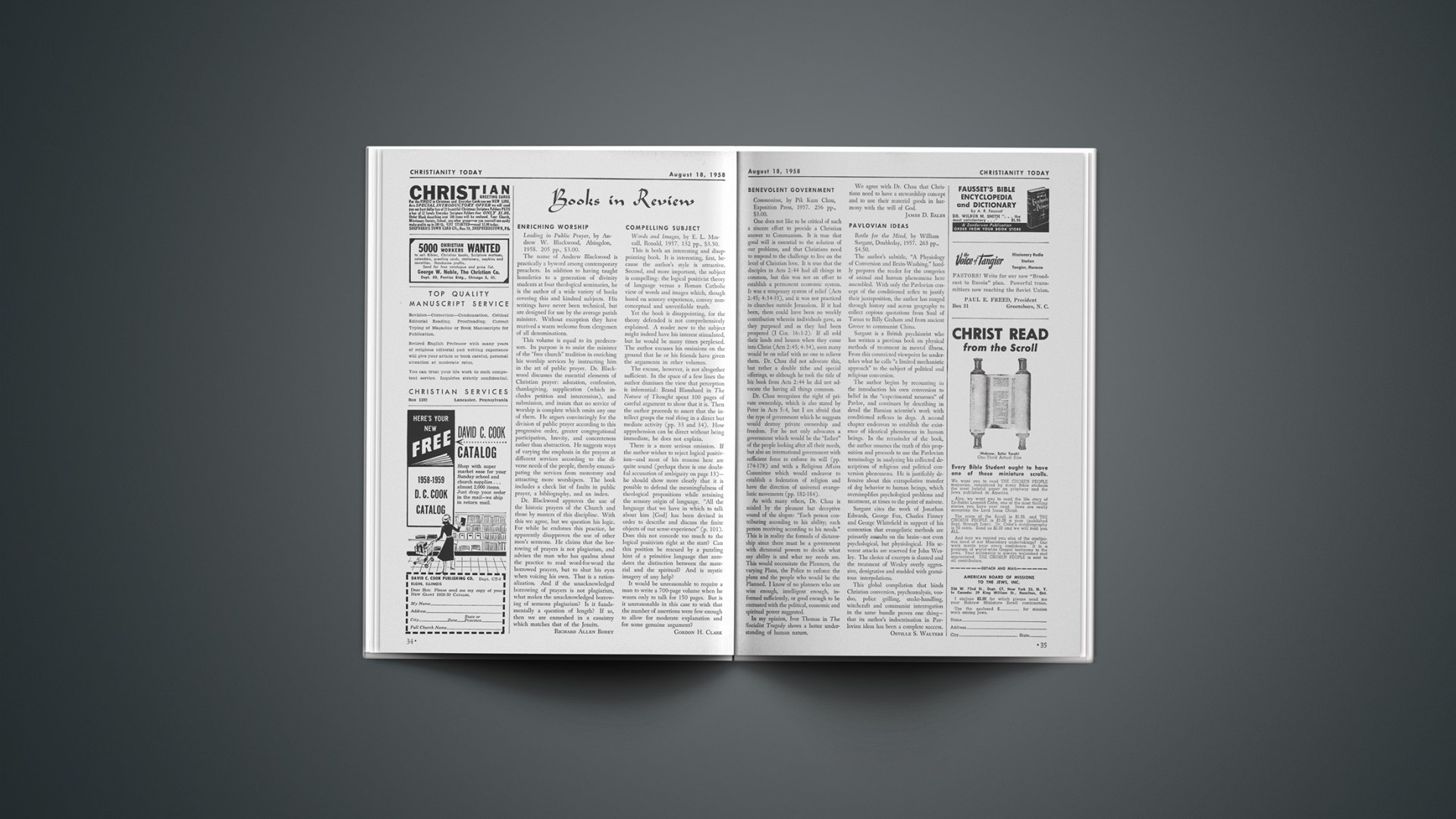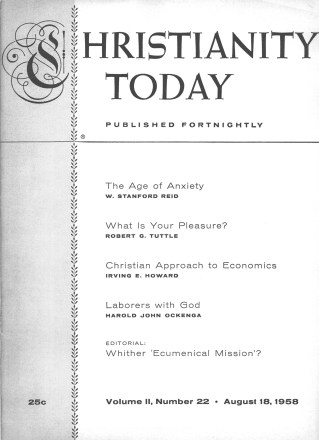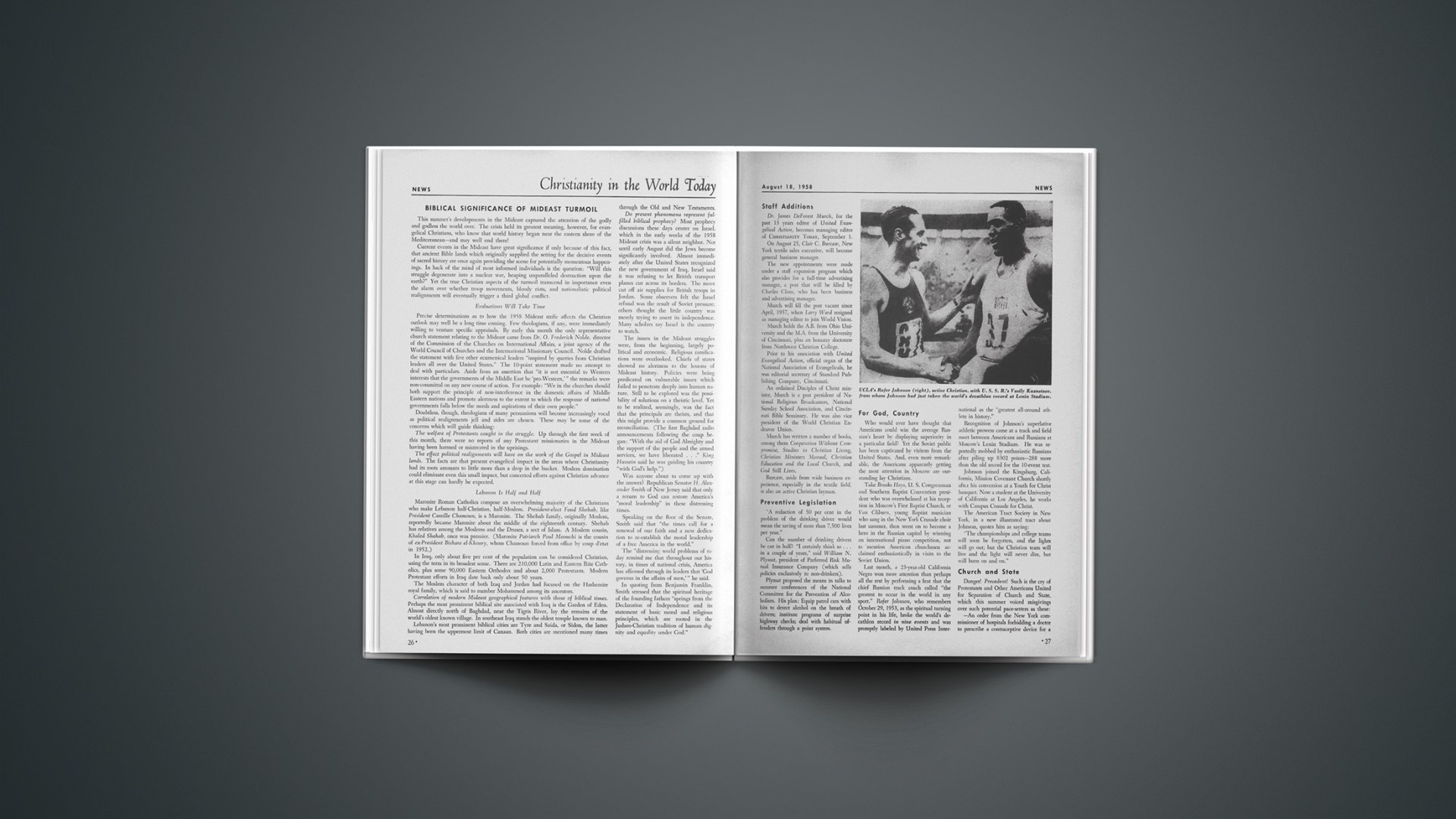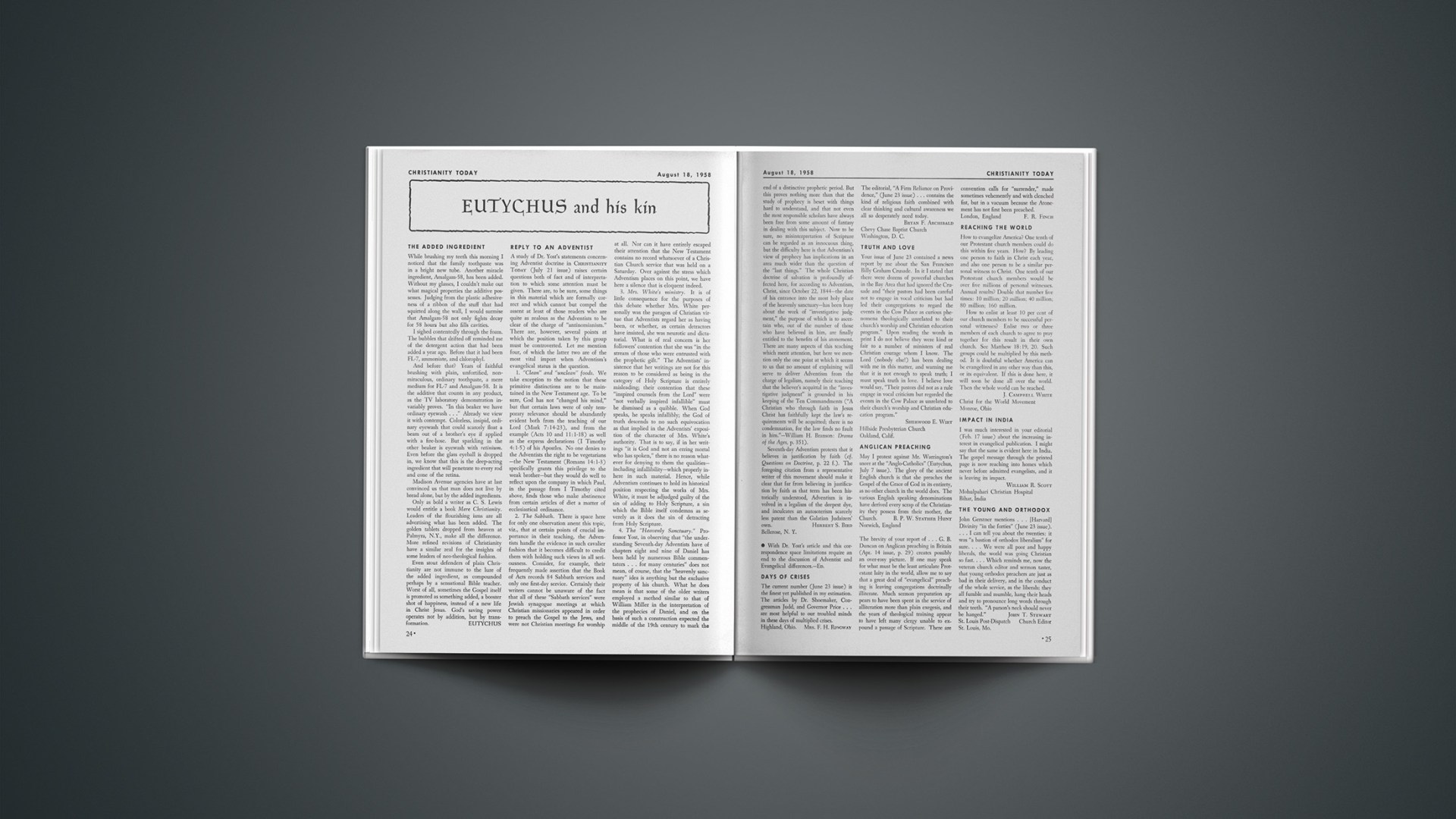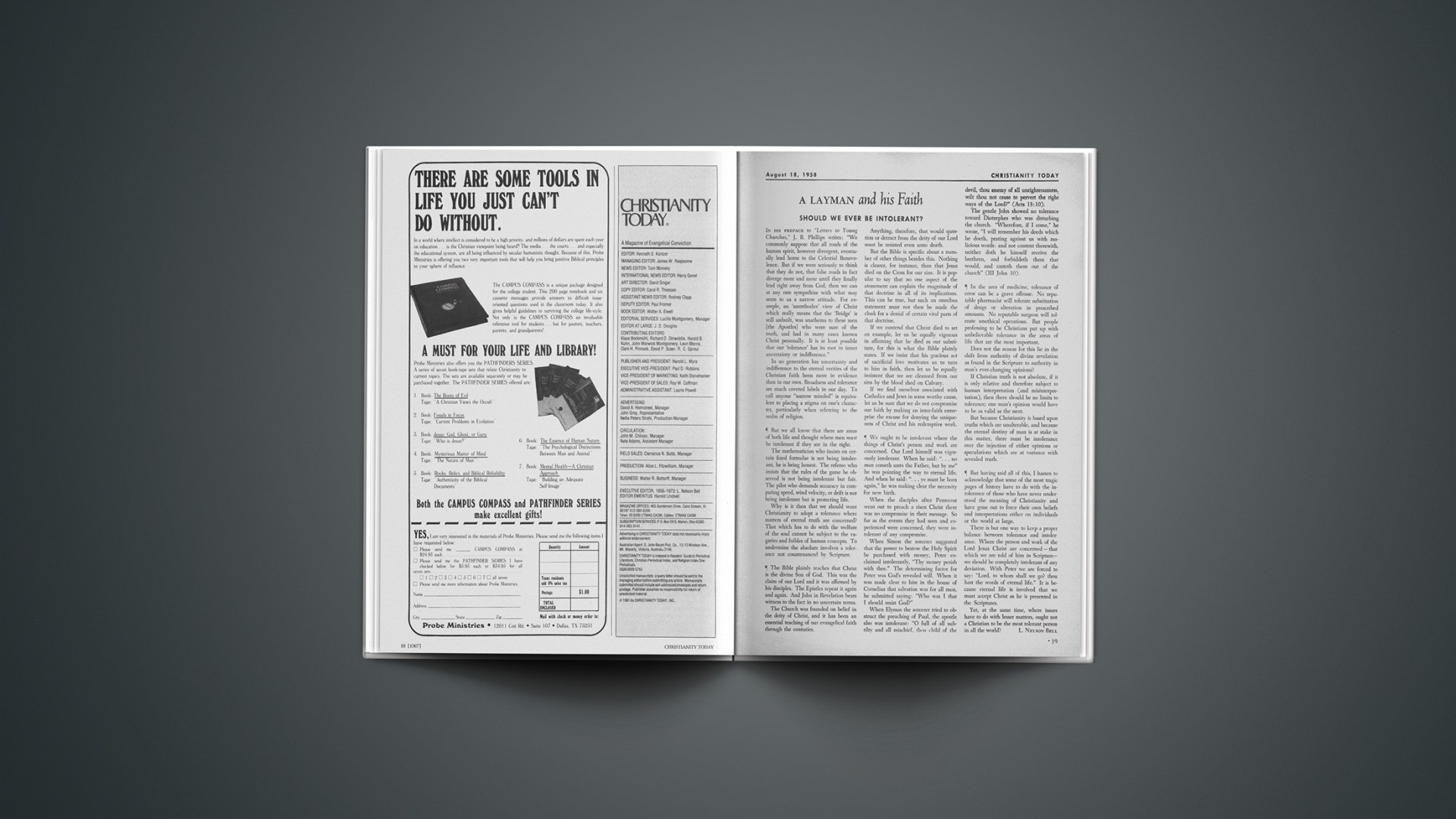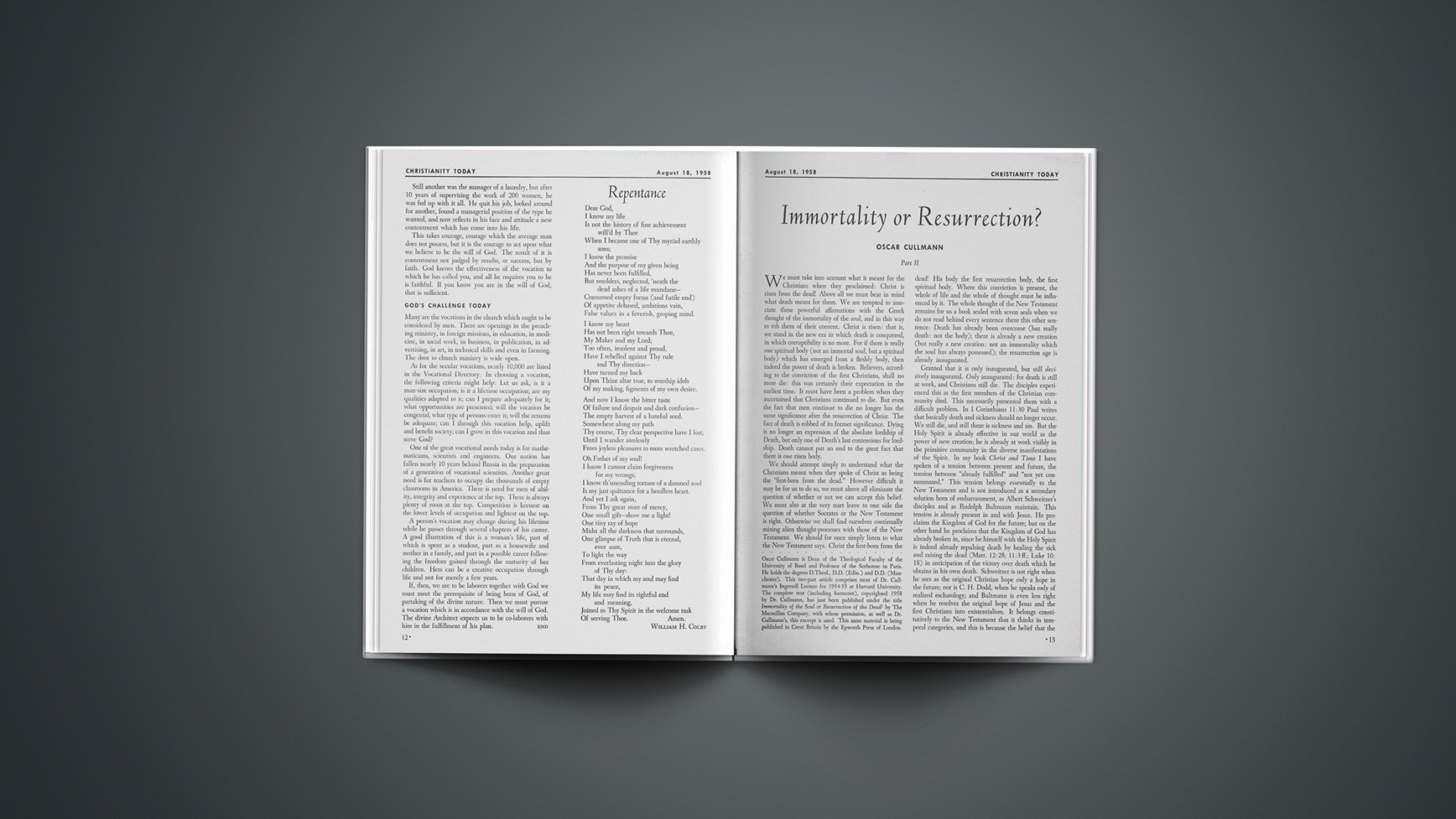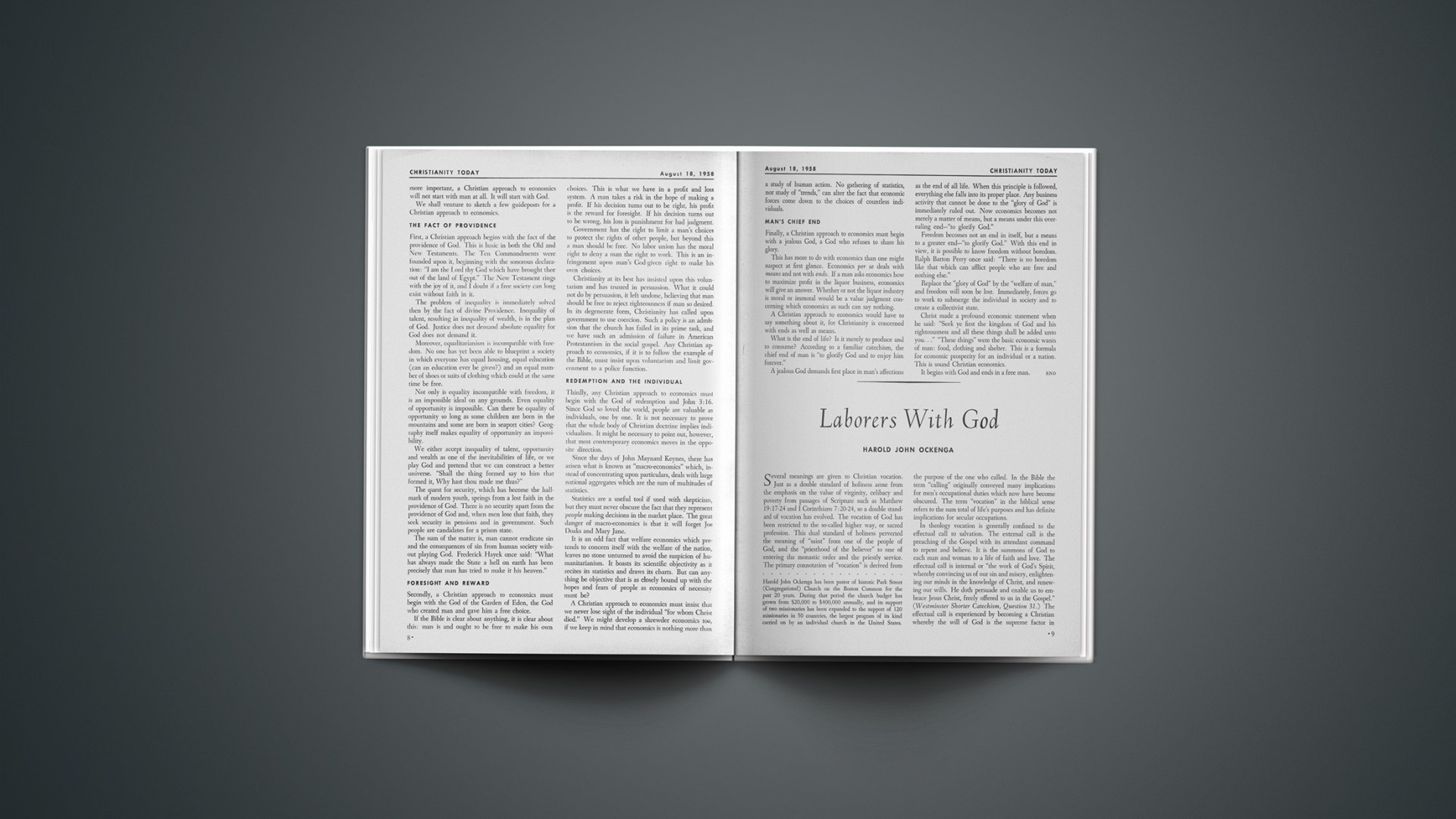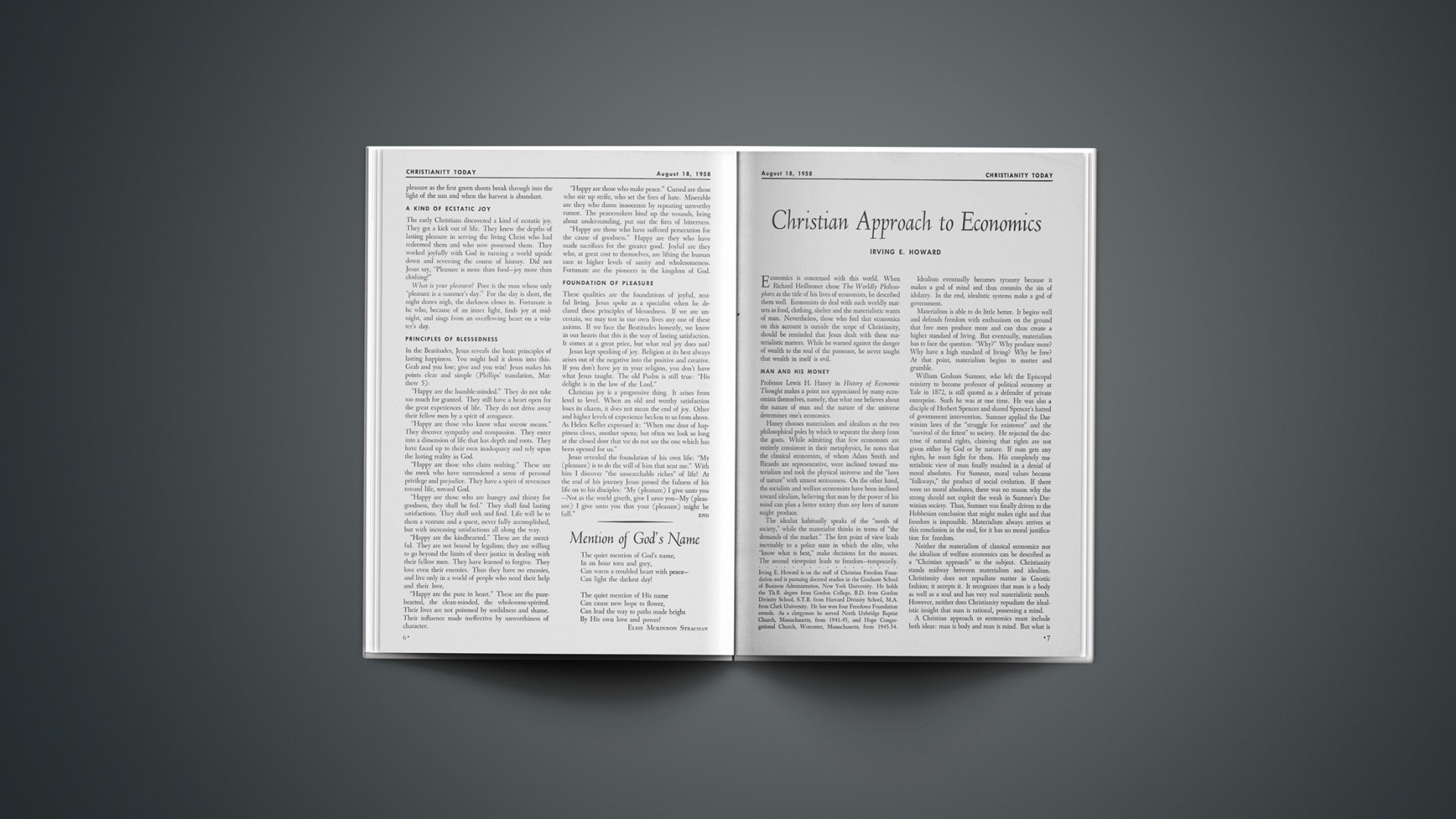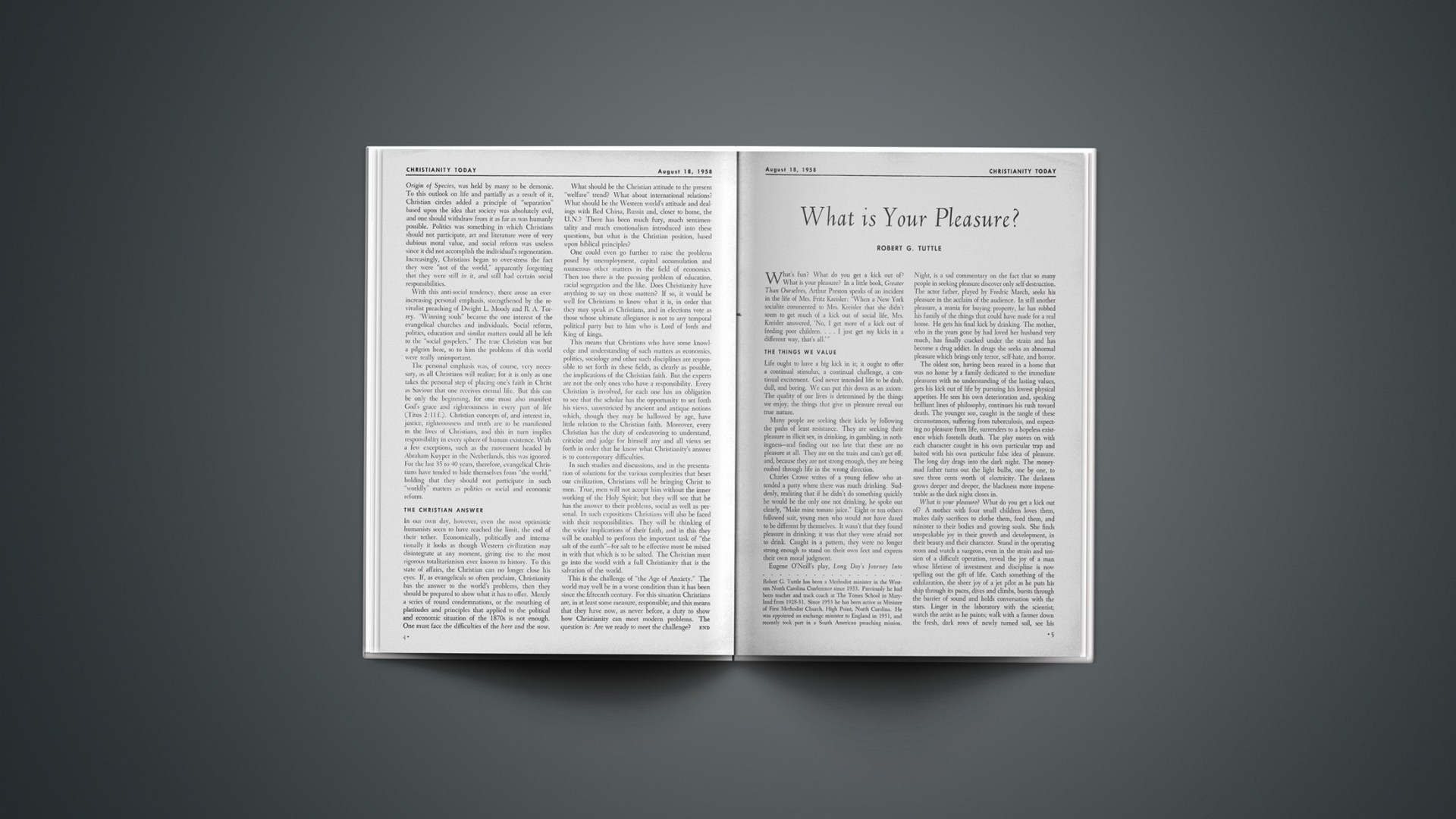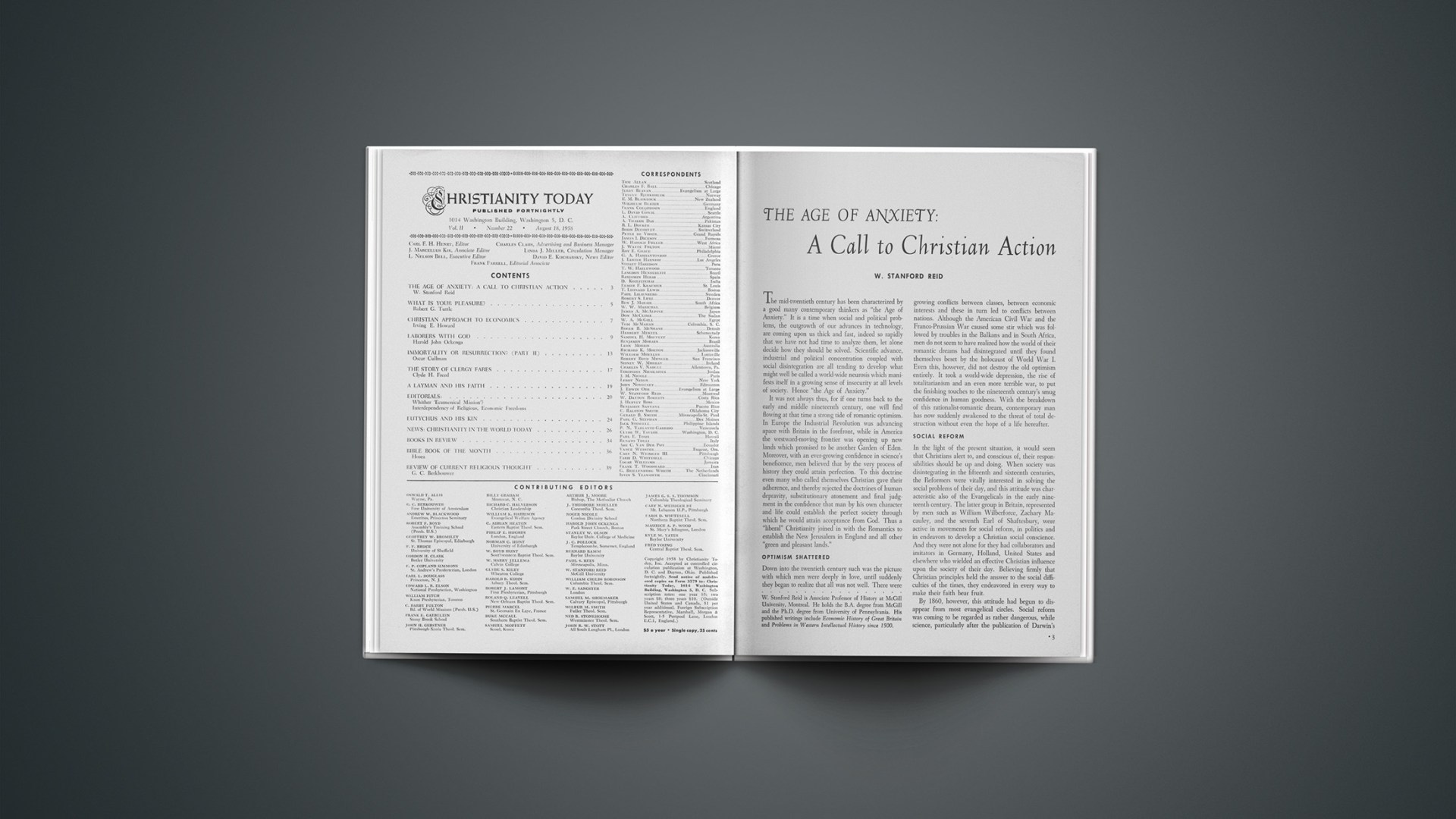Enriching Worship
Leading in Public Prayer, by Andrew W. Blackwood, Abingdon, 1958. 205 pp., $3.00.
The name of Andrew Blackwood is practically a byword among contemporary preachers. In addition to having taught homiletics to a generation of divinity students at four theological seminaries, he is the author of a wide variety of books covering this and kindred subjects. His writings have never been technical, but are designed for use by the average parish minister. Without exception they have received a warm welcome from clergymen of all denominations.
This volume is equal to its predecessors. Its purpose is to assist the minister of the “free church” tradition in enriching his worship services by instructing him in the art of public prayer. Dr. Blackwood discusses the essential elements of Christian prayer: adoration, confession, thanksgiving, supplication (which includes petition and intercession), and submission, and insists that no service of worship is complete which omits any one of them. He argues convincingly for the division of public prayer according to this progressive order, greater congregational participation, brevity, and concreteness rather than abstraction. He suggests ways of varying the emphasis in the prayers at different services according to the diverse needs of the people, thereby emancipating the services from monotony and attracting more worshipers. The book includes a check list of faults in public prayer, a bibliography, and an index.
Dr. Blackwood approves the use of the historic prayers of the Church and those by masters of this discipline. With this we agree, but we question his logic. For while he endorses this practice, he apparently disapproves the use of other men’s sermons. He claims that the borrowing of prayers is not plagiarism, and advises the man who has qualms about the practice to read word-for-word the borrowed prayers, but to shut his eyes when voicing his own. That is a rationalization. And if the unacknowledged borrowing of prayers is not plagiarism, what makes the unacknowledged borrowing of sermons plagiarism? Is it fundamentally a question of length? If so, then we are enmeshed in a casuistry which matches that of the Jesuits.
RICHARD ALLEN BODEY
Compelling Subject
Words and Images, by E. L. Mascall, Ronald, 1957. 132 pp., $3.50.
This is both an interesting and disappointing book. It is interesting, first, because the author’s style is attractive. Second, and more important, the subject is compelling: the logical positivist theory of language versus a Roman Catholic view of words and images which, though based on sensory experience, convey non-conceptual and unverifiable truth.
Yet the book is disappointing, for the theory defended is not comprehensively explained. A reader new to the subject might indeed have his interest stimulated, but he would be many times perplexed. The author excuses his omissions on the ground that he or his friends have given the arguments in other volumes.
The excuse, however, is not altogether sufficient. In the space of a few lines the author dismisses the view that perception is inferential: Brand Blanshard in The Nature of Thought spent 100 pages of careful argument to show that it is. Then the author proceeds to assert that the intellect grasps the real thing in a direct but mediate activity (pp. 33 and 34). How apprehension can be direct without being immediate, he does not explain.
There is a more serious omission. If the author wishes to reject logical positivism—and most of his reasons here are quite sound (perhaps there is one doubtful accusation of ambiguity on page 13)—he should show more clearly that it is possible to defend the meaningfulness of theological propositions while retaining the sensory origin of language. “All the language that we have in which to talk about him [God] has been devised in order to describe and discuss the finite objects of our sense-experience” (p. 101). Does this not concede too much to the logical positivists right at the start? Can this position be rescued by a puzzling hint of a primitive language that antedates the distinction between the material and the spiritual? And is mystic imagery of any help?
It would be unreasonable to require a man to write a 700-page volume when he wants only to talk for 150 pages. But is it unreasonable in this case to wish that the number of assertions were few enough to allow for moderate explanation and for some genuine argument?
GORDON H. CLARK
Benevolent Government
Commonism, by Pik Kum Chau, Exposition Press, 1957. 256 pp., $3.00.
One does not like to be critical of such a sincere effort to provide a Christian answer to Communism. It is true that good will is essential to the solution of our problems, and that Christians need to respond to the challenge to live on the level of Christian love. It is true that the disciples in Acts 2:44 had all things in common, but this was not an effort to establish a permanent economic system. It was a temporary system of relief (Acts 2:45; 4:34–35), and it was not practiced in churches outside Jerusalem. If it had been, there could have been no weekly contribution wherein individuals gave, as they purposed and as they had been prospered (1 Cor. 16:1–2). If all sold their lands and houses when they came into Christ (Acts 2:45; 4:34), soon many would be on relief with no one to relieve them. Dr. Chau did not advocate this, but rather a double tithe and special offerings, so although he took the title of his book from Acts 2:44 he did not advocate the having all things common.
Dr. Chau recognizes the right of private ownership, which is also stated by Peter in Acts 5:4, but I am afraid that the type of government which he suggests would destroy private ownership and freedom. For he not only advocates a government which would be the “father” of the people looking after all their needs, but also an international government with sufficient force to enforce its will (pp. 174–178) and with a Religious Affairs Committee which would endeavor to establish a federation of religion and have the direction of universal evangelistic movements (pp. 182–184).
As with many others, Dr. Chau is misled by the pleasant but deceptive sound of the slogan: “Each person contributing according to his ability; each person receiving according to his needs.” This is in reality the formula of dictatorship since there must be a government with dictatorial powers to decide what my ability is and what my needs are. This would necessitate the Planners, the varying Plans, the Police to enforce the plans and the people who would be the Planned. I know of no planners who are wise enough, intelligent enough, informed sufficiently, or good enough to be entrusted with the political, economic and spiritual power suggested.
In my opinion, Ivor Thomas in The Socialist Tragedy shows a better understanding of human nature.
We agree with Dr. Chau that Christians need to have a stewardship concept and to use their material goods in harmony with the will of God.
JAMES D. BALES
Pavlovian Ideas
Battle for the Mind, by William Sargant, Doubleday, 1957. 263 pp., $4.50.
The author’s subtitle, “A Physiology of Conversion and Brain-Washing,” hardly prepares the reader for the congeries of animal and human phenomena here assembled. With only the Pavlovian concept of the conditioned reflex to justify their juxtaposition, the author has ranged through history and across geography to collect copious quotations from Saul of Tarsus to Billy Graham and from ancient Greece to communist China.
Sargant is a British psychiatrist who has written a previous book on physical methods of treatment in mental illness. From this constricted viewpoint he undertakes what he calls “a limited mechanistic approach” to the subject of political and religious conversion.
The author begins by recounting in the introduction his own conversion to belief in the “experimental neuroses” of Pavlov, and continues by describing in detail the Russian scientist’s work with conditioned reflexes in dogs. A second chapter endeavors to establish the existence of identical phenomena in human beings. In the remainder of the book, the author assumes the truth of this proposition and proceeds to use the Pavlovian terminology in analyzing his collected descriptions of religious and political conversion phenomena. He is justifiably defensive about this extrapolative transfer of dog behavior to human beings, which oversimplifies psychological problems and treatment, at times to the point of naivete.
Sargant cites the work of Jonathan Edwards, George Fox, Charles Finney and George Whitefield in support of his contention that evangelistic methods are primarily assaults on the brain—not even psychological, but physiological. His severest attacks are reserved for John Wesley. The choice of excerpts is slanted and the treatment of Wesley overly aggressive, denigrative and studded with gratuitous interpolations.
This global compilation that binds Christian conversion, psychoanalysis, voodoo, police grilling, snake-handling, witchcraft and communist interrogation in the same bundle proves one thing—that its author’s indoctrination in Pavlovian ideas has been a complete success.
ORVILLE S. WALTERS

